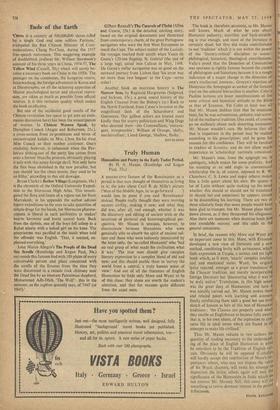Truly Human
A DISTINCTIVE feature of the Renaissance as a period is that men thought of themselves as living in it; the joke about Cecil B. de Mille's picture (`Men of the Middle Ages, let us go forward . . .') would lose its point if you said 'Renaissance' instead. People really thought they were reviving ancient civility, making it new; and what they did was, after all, real enough, whether it was the discovery and editing of ancient texts or the invention of pictorial and historiographical per- spective. Mr. Mason is anxious, however, to discriminate between Humanists who were genuinely able to absorb the spirit of ancient cul- ture and those who were tediously intoxicated by the letter only, the 'so-called Humanist' who 'had no real grasp of what made his civilisation what it was.' The true men should give complex literary expression to a complex blend of old and new; and this should enable them to 'survey the world from a central, a truly human point of view.' And out of all the literature of English Humanism he finds only More and Wyatt to be of this class; they alone are worth the student's attention, and that for reasons quite different from the usual ones. The book is, therefore, eccentric, as Mr. Mason well knows. Much of what he says about Humanist pedantry, scurrility and' back-scratch- ing is true enough, and most of the literature is certainly dead; but they did make contributions to our 'tradition' which it is not within the power of the 'literary-critical' discipline to assess : philological, historical, theological contributions. Valla's proof that the Donation of Constantine was spurious is rightly famous beyond the circles of philologists and historians because it is a rough indication of a major change in the direction of men's intellectual interests ; Grocyn's rejection of Dionysius the Areopagite as author of the famous tract on the celestial hierarchies is another. Colet's Pauline lectures are lesser manifestations of the same critical and historical attitude to the Bible as that of Erasmus. Yet Colet at least was all that Mr. Mason dislikes (not that he mentions him), for he was acrimonious, pedantic and scorn- ful of the mediteval tradition. One could, of course, go on endlessly about such distorting omissions. Mr. Mason wouldn't care. He believes that all that is important in the period may be studied according to his prescription; and he gives his reasons for this confidence. They will be familiar to readers of Scrutiny, and do not allow much importance to 'scholarship' narrowly conceived.
Mr. Mason's tone, from the epigraph on, is apologetic, which makes for some prolixity. And his standing at an odd angle to conventional scholarship (he is, of course, opposed to R. W. Chambers, C. S. Lewis and many others) makes him a little queer about his own. He quotes a lot of Latin without quite making up his mind whether this should or should not be translated (it should be) and sometimes he appears almost to be dissembling his learning. There are two or three scholarly finds that some people would have been glad to trumpet, but Mr. Mason plays them down almost, as if they threatened his allegiance. Also there are moments when doctrine leads hint into avoidable naiveté, and this adds to the general uneasiness.
In brief, the reasons why More and Wyatt are I
so important come to this. More, with Erasmus, developed a new view of literature and a nevi method, combining levity with seriousness, which finds expression in Utopia, a serious and yet light book which,. as it were, 'enacts' complex intellec- tual and emotional states. Wyatt, his original lyrics rejected, emerges as a grant translatcur in the Chaucer tradition, not merely incorporating foreign literature but 'discovering what it was to be truly native.' Translation, in this high sense, was the great duty of Humanism; and here it was notably carried out. Mr. Mason makes these and related points with learning and acumen, finally reinforcing them with a good but too brief sketch of Jonson as heir of this best of Humanist traditions: 'the Classics are properly used when they enable an Englishman to become fully aware, that is, in his own idiom, of the aspiration to con' ceive life in ideal terms which are found in all attempts to make life civilised.'
Thus Mr. Mason reduces to two authors the quantity of reading necessary to the understand- ing of the place of English Humanists in what he considers to be the Tradition of English cul- ture. Obviously he will be opposed (Catholics will hardly accept this redefinition of More's 411' portance; others, who may not dispute the value of his Wyatt chapters, will resist his attempt to depreciate the lyrics; others again will seek the significance of the Humanists in fields which do not interest Mr. Mason). Still,' this essay will d° something to revive dormant interest in the period it discusses.
FRANK KERMODI3






































 Previous page
Previous page